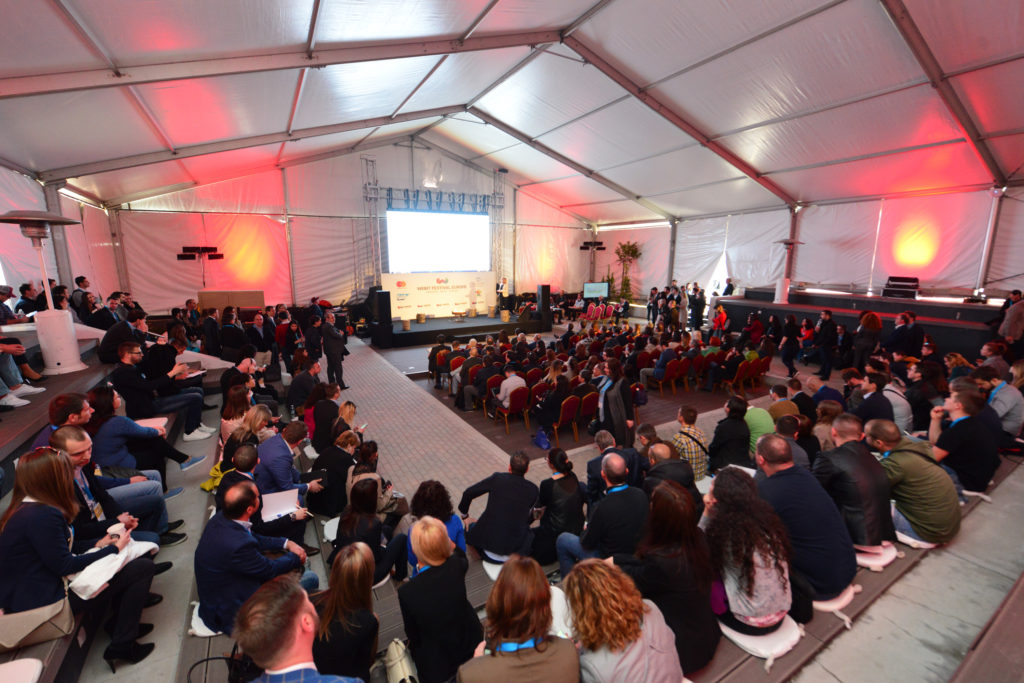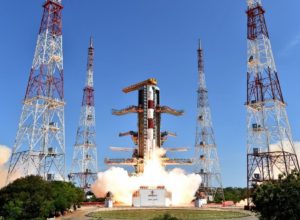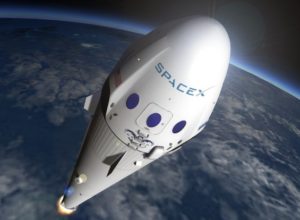Tag: Space
Huge opportunities for investors and entrepreneurs in the Space Industry
Currently, the global infrastructure is expanding into Space. The truth is, this is something that has already started happening. The commercial activity in Space creates many opportunities for both investors and entrepreneurs. It is expected to exceed government activity by 2020.
At the 2017 edition of Webit.Festival Europe the Chairman of Space Angels Network Joe Landon talked about the entrepreneurial revolution in Space. Space Angels is a company which searches the world for the best space startups. It aims to create opportunities for the investors while enabling them to make profit from the commercial space industry.
No matter what the industry is, new technology is always considered crazy at first. The Space was once considered science fiction, now it is a science fact. To make the topic more tangible, Joe Landon shared a couple of examples of innovations in the Space industry with the audience at Webit.
The Falcon-9 Rocket was launched, landed and re-launched by SpaceX. Such reusable rockets spread the costs over the multiple launches and present a revolution in the Space industry. The Blue Origin - the space company of Jeff Bezos, the CEO of Amazon, had a similar success with its New Shepard suborbital rocket. It was launched and landed five times in a year.
 There are many forces which when acting together make Space innovations possible. Joe Landon stressed on the importance of the development in technology which reduces the costs of sending things to the Space. He emphasized on the role of the revolution in satellite technology.
Commercial communication satellites a couple of years back were very heavy and extremely expensive to make and launch. It was important for these satellites to last for 15 years and to be very reliable which required further financing.
The satellites from today can be held in a person’s hand and are far cheaper to produce and launch than their multi-million spacecraft predecessor. It is possible to launch dozens of them at the same time. This technology has a great impact on the space economy. Huge opportunities for investors and entrepreneurs arise.
There are many forces which when acting together make Space innovations possible. Joe Landon stressed on the importance of the development in technology which reduces the costs of sending things to the Space. He emphasized on the role of the revolution in satellite technology.
Commercial communication satellites a couple of years back were very heavy and extremely expensive to make and launch. It was important for these satellites to last for 15 years and to be very reliable which required further financing.
The satellites from today can be held in a person’s hand and are far cheaper to produce and launch than their multi-million spacecraft predecessor. It is possible to launch dozens of them at the same time. This technology has a great impact on the space economy. Huge opportunities for investors and entrepreneurs arise.
“Reusability in Space is very important.”, Landon said.There are innovations concerning 3D printing in Space. The company Made-in Space created a zero gravity 3D printer which enables the astronauts to print the exact tool they need in Space which lowers the costs. 3D Systems is a company which created the first manufactured object from asteroid material. The European banking center created $227 million fund to invest in space mining projects. According to a research report on the opportunities in the commercial space economy by Goldman Sachs, the costs of asteroid mining are comparable to these in Earth mines.
 There are many forces which when acting together make Space innovations possible. Joe Landon stressed on the importance of the development in technology which reduces the costs of sending things to the Space. He emphasized on the role of the revolution in satellite technology.
Commercial communication satellites a couple of years back were very heavy and extremely expensive to make and launch. It was important for these satellites to last for 15 years and to be very reliable which required further financing.
The satellites from today can be held in a person’s hand and are far cheaper to produce and launch than their multi-million spacecraft predecessor. It is possible to launch dozens of them at the same time. This technology has a great impact on the space economy. Huge opportunities for investors and entrepreneurs arise.
There are many forces which when acting together make Space innovations possible. Joe Landon stressed on the importance of the development in technology which reduces the costs of sending things to the Space. He emphasized on the role of the revolution in satellite technology.
Commercial communication satellites a couple of years back were very heavy and extremely expensive to make and launch. It was important for these satellites to last for 15 years and to be very reliable which required further financing.
The satellites from today can be held in a person’s hand and are far cheaper to produce and launch than their multi-million spacecraft predecessor. It is possible to launch dozens of them at the same time. This technology has a great impact on the space economy. Huge opportunities for investors and entrepreneurs arise.
“In ten years satellites will cost 10,000 times less, they will have 1,000 times lower mass and the launch will cost 350 times less.”, Joe Landon said.He dispelled the myth that space companies need extremely big investments in comparison to other tech companies. In fact, the seeds and Series-A investment in space startups is identical to the rest of the tech market. The truth is that space companies from the past needed a lot of funding to build the expensive infrastructure which the space companies of today use. This advantage enables them to develop low-cost, quick businesses. Another myth is that space companies take too long before making any actual profit. The numbers show that since 2009 $14 billion were accounted as exits in the Space industry.
“In the future we’d like to think there are millions of people living and working in the Space.”, Landon said.We are not talking about sending only missions to the Space, but also forming communities. Astronauts will be joined by people with all kind of expertise such as teachers, lawyers and doctors. Today, very few people go to Space. According to Landon in one or two generations there will be people who have lived their entire life only in the Space. This completely different perspective when the Earth is observed from the Space can change the way we think about it. As the Apollo 14 astronaut Edgar Mitchell said:
“You develop an instant global consciousness, a people orientation, an intense dissatisfaction with the state of the world, and a compulsion to do something about it.”You can watch his full lecture here: If you want to keep up with the latest trends in the world of digital economy and technology, then Webit.Festival is the right place for you. Visit our website and book 2 in 1 of our Super Earlybird tickets for Webit.Festival Europe 2018. Feel the Webit vibe with some of the best photos from this year’s event! [easingslider id="4954"]
India reaches to the stars with the launching of 104 satellites...
Aerospace industry worldwide is experiencing a renaissance, but unlike the space race years during the Cold War, now the innovations come not only from American and Russian government agencies, but also from emerging economies like India.
Just yesterday the Asian country made history by successfully launching 104 satellites on a single mission, surpassing the previous record of 37 satellites, launched by Russia 3 years ago.
Experts say this is a sign that India is emerging as a major player in the multi-billion dollar space market, while the Prime Minister of the country Narendra Modi was among the first to congratulate the team behind the effort. He tweeted that this is another proud moment for the nation’s scientific community.
The main task of the launch was to get the Cartosat-2 Earth-observation satellite in orbit. It is expected to be used for monitoring of India's local rivals - Pakistan and China. The other 103 spacecraft were nanosatellites, provided by countries like Israel, Kazakhstan, the Netherlands, Switzerland, the United Arab Emirates and the United States. 88 of them are owned by the San Francisco company Planet (ex Planet Labs). Their dimensions are just 30 by 10 by 10 centimeters, while their weight is about 4.5 kilograms. Despite the small size, they have sharp vision and can observe the Earth surface with precision. During the last year’s Webit.Festival in Sofia the European Space Agency (ESA) engineer and coordinator Lluc Diaz spoke about the institution’s mutual work with startups, like Planet Labs. The expert explained the benefits from launching small communication satellites, that cost between $10 and $100 million, unlike the big ones for $500 million. The small devices are easier to maintain and can be replaced with new ones when they are hit by space junk for example. Last year 210 satellites weighing less than 50 kilograms were launched this year to do such things as map the Earth, expand broadband access and track packages on shipping vessels. Тhat is up from just 25 launches in 2010. The 2016 number is expected to double in the next five years. If you want to keep up with the hottest trends in the space industry Webit.Festival is the right place for you. During the event, you can find out more about the future of exploration of the Universe from top level speakers, likе the Chairman of Breakthrough Prize Foundation Simon P. Worden. The author of more than 150 scientific papers in astrophysics space sciences and strategic studies will talk about the search of life beyond the Earth and deep space traveling.This remarkable feat by @isro is yet another proud moment for our space scientific community and the nation. India salutes our scientists.
— Narendra Modi (@narendramodi) February 15, 2017
Private sector is driving the new age of space exploration
History of the human race is full of stories of amazing leaps, from migrating out of Africa to landing our spacecrafts on other planets and even asteroids. Nearly 50 years after first human steps on the Moon the space industry is completely different, than it was in the 20th century.
Contrary to perceptions, space industry is extremely traditional because of the high costs and need of minimal risk. But now private companies are beginning to take the initiative and to change our ideas about space as a place, reserved for government agencies.
There was a time when NASA and Roskosmos were the two main engines of our dreams for space exploration. But over the last 15 years that has changed with tens of space companies entering the market with serious plans for building rockets and colonizing new world.
Today almost everyone is aware of Virgin Galactic, SpaceX and Blue Origin, mostly due to the popularity of their celebrity entrepreneur owners. If their efforts for creating a reusable booster succeeds, this can lower the costs for space launch with as much as 60%.
And this is not even the whole picture. Hundreds of small startups have popped up for the new space race. Companies like Astrobotics are charging $1.2 million per kilo to take your stuff to the moon, while experts in Saber Aeronautics are using video game tech to help you create missions and operate satellites with minimum training.
During last year’s Webit.Festival in Sofia the project coordinator and engineer at European Space Agency (ESA) Lluc Diaz explained that because of the numerous private initiatives mankind is starting to look for the exploration of deep space.
In Europe, all this is happening not only with private capital, but through programs for public-private partnerships. Right now ESA is working with more than 400 startups, helping them with expert knowledge about implementation of space tech in our everyday life.
Great example of this kind of partnership is the success of companies like Planet Labs, that creates smaller and cheaper satellites that are easier to launch in space.
This year on Webit.Festival you can find out more about the future of space industry and exploration of the Universe from top level speakers, likе the Chairman of Breakthrough Prize Foundation Simon P. Worden.
The author of more than 150 scientific papers in astrophysics space sciences and strategic studies will talk about the search of life beyond the Earth and deep space traveling.


